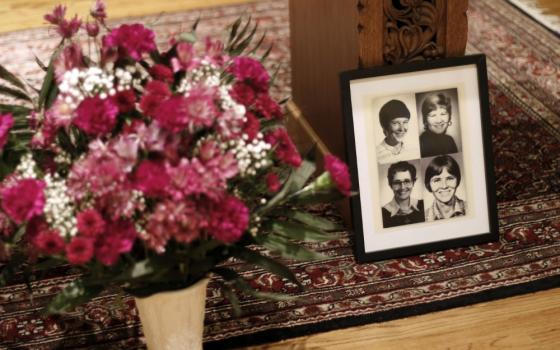To this day, the 1980 murders of four U.S. churchwomen in El Salvador looms large in the consciousness of the religious community.
One reason is the heinousness of the crime: The three women religious and the lay missionary were kidnapped, raped, shot execution-style and buried in a mass grave. It was truly a slaughter of innocents.
But it also sticks with us because of the mystery over who exactly committed the act, who ordered it, how it was carried out, and the U.S. government's complicity through its policy of supporting the military regime certainly behind it.
Slowly, over the decades, the facts have dribbled out. And on Feb. 11, yet another story in the awful saga came to light in a joint report by ProPublica and The Atlantic. This chapter tells the story of a junior U.S. diplomat and how he singlehandedly cracked the case:
In the years since, much has come to light about this pivotal event in the history of U.S. interventions in Central America. But the full story of how one of the most junior officers in the U.S. embassy in San Salvador tracked down the killers has never been told. It is the tale of an improbable bond between a Salvadoran soldier with a guilty conscience and a young American diplomat with a moral conscience. Different as they were, both men shared a willingness to risk their lives in the name of justice.
The story relates how diplomat H. Carl Gettinger developed a relationship with a Salvadoran lieutenant who had himself committed atrocities, but also felt victimized by a regime that appeared to be less about defeating communist guerillas and more about protecting and advancing the aims of the rich. The lieutenant seemed willing to tell Gettinger anything:
Within the embassy, Gettinger's relationship with the lieutenant was carefully guarded. But those colleagues who did know about it, even if vaguely, were astonished at what Gettinger was able to get from him and would ask jokingly if Gettinger had pictures of the officer in compromising situations. The CIA typically uses bribes and blackmail to recruit sources. Gettinger did neither, and he was never quite certain why the lieutenant came to confess so much. 'I think we hit it off because I treated him with dignity and respect,' Gettinger told me.
Eventually, the lieutenant not only gave Gettinger the names of the soldiers involved, but even provided a tape recording of the soldier who led the operation incriminating himself. What followed was years of denial by the Reagan administration, which wanted to blame the murders on the pro-communist guerrillas.
In 1984, five of the soldiers went on trial and were found guilty on all counts. The FBI honored Gettinger for his efforts, but the reason for the honor was classified. Gettinger's work was kept secret for years, first by officials who wanted to protect the Salvadoran government they were supporting and later to protect the life of the lieutenant who was the source of the information. In 1998, the lieutenant was murdered, though it remains unclear whether it was government or rebel forces that killed him.
When art is life
They say that art — even fiction — can be more true than the truth itself because it exposes the values at the heart of what it means to be human.
But the truth presented as art can be just as powerful, and two art exhibits show the truth of the Central American mass migration to the United States in all its stark reality.
In Denver, an exhibit shows the harsh conditions faced by asylum-seekers put into federal detention for seeking a better life.
Meanwhile, a portfolio of photographs by Tom Kiefer called El Sueno Americano, or "The American Dream," shows the items that Border Patrol agents seized from asylum-seekers and later threw away. Kiefer, who was a janitor for the Border Patrol in Arizona, collected then photographed the items.
Both exhibits are powerful reminders of the humanity of the detainees and our responsibility to remember it.
Remember, links, tips and accounts of the response to any crisis anywhere in the world are always welcome at dstockman@ncronline.org.
[Dan Stockman is national correspondent for Global Sisters Report. Follow him on Twitter @DanStockman or on Facebook.]

